Some important changes, including 45 minute round times becoming standard. Also no asking your opponent if you know any of their cards.
Konami has updated their Tournament Policy Documents again. These documents are incredibly important to any player attending a large event, although these apply to OTS locals as well. You can read the current version of these docs here. Accompanying these changes is a post on Konami’s offcial blog outlining the changes.
In this article we will outline the information in the official blog and extrapolate on certain policy changes we think may be important for players to understand. If we didn’t spoiler it, it’s not spoilered for a reason. Read it twice.
THIS IS ARTICLE NOT A SUBSTITUTE FOR READING EITHER KONAMI OFFICIAL TOURNAMENT POLICY, NOR IS IT A SUBSTITUTE FOR KONAMI’S OFFICAL BLOG POST. WE ADVISE YOU READ BOTH OF THEM IN THEIR ENTIRETY YOURSELF.
We advise players especially review the changes in: Section 2, Section 4 and Section 6.
Section I. Preparing to Play
Subsection C. Head Judge What changed? What does this mean? Even though the Head Judge’s decisions are final, the Head Judge is still bound by official policy. This is a new section. Konami added this section to make information about the Assistant Head Judge/Public Event Lead roles easier to find and understand. At Tier 3 events such as a YCS or WCQ, the Assistant Head Judges and the Public Events Lead have most of the same authority as a Head Judge, in reference to their specific tasks.Spoiler
Spoiler
Subsection E. Floor Judge
What changed?
- We expanded and clarified the information about questions judges should and should not answer, including new examples.
- We separated the “should answer” and “should not answer” into separate sections, to make it easier to process and retain the information.
What does this mean?
The additional information should make it easier to understand when it is or is not appropriate to answer questions; and what kinds of questions are appropriate or not appropriate to ask.
We recommend players and judges alike review the examples to understand the types of questions and information a judge can explain.
Subsection J. Media
These updates will not apply to everyone, but be aware some have been made. Ygorganization recommends any content creators or others who may intend to make content out of an official event, and familiarize themselves with the code of conduct. Likewise if you are an actual Journalist.
Section II. Duelist Responsibilities
Subsection I. Communication
What changed?
- We expanded the section on Retracting Legal Moves.
- We separated the “cannot retract” from “can retract due to illegal activation,” as there is currently some confusion about whether or not a Duelist can retract an illegal activation vs. being forced to change to a legal target.
- We explained the process for resolving an illegal action.
What does this mean?
Judges and Duelists have had questions about retracting legal moves or resolving an illegal action, that were not clearly addressed in the previous version of the document. This additional information should make it clearer.
We below are some screenshots from these policy documents that illustrate what kinds of examples you may encounter in a proper tournament setting. These DO NOT represent all possible examples. Read the policy docs.
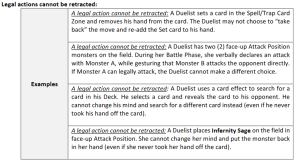
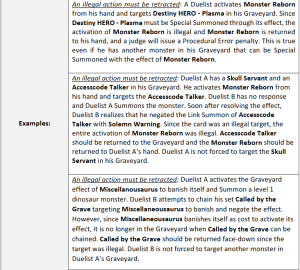
Subsection L. Livestreamed Events What changed? This is a new section. It covers policy related to appearing on camera at a Livestreamed event. What does this mean? There are certain policies with which you need to comply, if you will appear on-camera at a Livestreamed event – this includes requirements for tournament materials as well as conduct.Spoiler
This is basically saying if you’re on stream, use only officially licensed Yu-Gi-Oh TCG merch or non-branded merch with most exemptions for merch from an OTS store. Including sleeves, game mats, etc. No accessories with logos of other brands or IPs may be used on stream. Not included in this section is anything regarding behavior, but it goes without saying don’t act like a goofy or a ghoul on livestream.
There is no information in this section regarding imported merch from other territories such as the OCG. If you intend on using imported OCG sleeves and want a feature match, check with tournament officials for whether or not that is acceptable.
Section III. Tournament Information
Subsection C. Time Limits What changed? Round times for Tier 1, Tier 2, and Tier 3 in-person events are now 45 minutes. What does this mean? The 45-minute Round times at Tier 3 events should now be used for Tier 1 and 2 events.Spoiler
The tldr is: Rejoice, 45 minute rounds are now the standard. Let’s Freakin Gooooooooooooooooooooooo.
Section IV. Tournament Play
There are some significant changes to this section!
Subsection B. Special Assistance
If you or someone you know may require special assistance for seating, a disability, service animal, or anything else, please read this section thoroughly in the policy documents.
Subsection C. Tournament Registration
There is now a section for online registration.
Subsection D. Deck Registration
What changed?
We reorganized this entire section, making it much easier for Duelists and Judges to find the correct information for online registration and in-person registration.
- Duelists can re-submit Deck Lists submitted online, but only to accommodate for a new Forbidden & Limited List or a new product release.
- Deck Lists cannot be changed for any other reason, and this only applies to Decks registered online.
- Duelists cannot drop from an event and re-register in an attempt to alter their Deck List.
What does this mean?
Deck registration policy is different for in-person registration and online registration. Read through this section to make sure you understand what is required for both types of registration.
Don’t extrapolate, assume, or take someone else’s word for what the policy means – read this section carefully before you register your Deck List for a tournament.
Subsection G. Sleeves What changed? What does this mean? Hopefully these clarifications will clear up some common misunderstandings about sleeving.Spoiler
These are largely clarifications. Review policy docs to make sure your sleeves are acceptable.
Subsection H. Tournament Materials What changed? What does this mean? The most popular change here is the inclusion of “zone markers” in Tournament Materials. Please read the requirements carefully to ensure that your zone markers are within policy. You will also need to make sure your tournament materials are within specific policy if you are on-camera for a Livestreamed match – Livestream policies are more strict than the general policies for tournament materials.Spoiler
The main take away is “zone markers” have been added to tournament materials.
Subsection I. Field Layout What changed? We updated example text for placing cards on the field with the text used in the Speed Duel Addendum. What does this mean? We are just keeping policy and wording consistent between documents.Spoiler
Subsection J. Note-Taking What changed? What does this mean? This section is clearer now and easier to understand.Spoiler
The main changes here are regarding layout and clarifications. READ THIS SECTION IN THE POLICY DOCS.
Subsection L. Public Knowledge
What changed?
- We clarified what Public Knowledge covers.
- We listed out what actions are considered part of Public Knowledge.
What does this mean?
Public Knowledge has some specific limitations – some Duelists and Judges have taken “card text is Public Knowledge” to mean “you can ask for information on absolutely any card.” This is not the case, and this has been clarified.
Subsection M. Private Knowledge
What changed?
- We clarified what Private Knowledge covers.
- We clarified that if you give out false information about Private Knowledge, you will be Disqualified.
- We clarified that intentionally revealing Private Knowledge may result in a Disqualification.
What does this mean?
Clarifications in this section should make it easier to tell the difference between Public and Private Knowledge, and easier to understand the kinds of penalties that can be incurred by lying about or revealing Private Knowledge.
There’s a lot to unpack here in the actual docs, so we will include screenshots from the policy documents with further information.
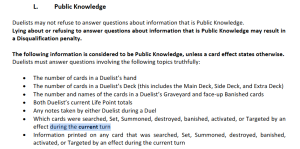
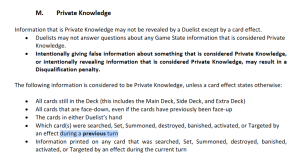
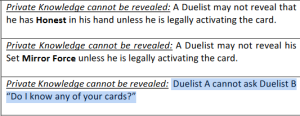
Subsection N. Card/Hand/Deck Verification What changed? What does this mean? Hopefully some common misconceptions are now cleared up!Spoiler
Subsection O. Handling Card Loops What changed? We added restrictions for controlled loops without “net gain” die roll effects, or if different actions will result in the same start or end point. What does this mean? This policy is intended to prevent Slow Play or Stalling by performing pointless actions within a controlled loop.Spoiler
This section should be read by everyone, but primarily pertains to situations where players intend to loop the same set of effects and interactions multiple times in one turn.
Subsection Q. Conceding a Game or Match What changed? What does this mean? We are just making sure the policies for conceding are clear.Spoiler
The 2 Main take aways in the documents here seems to be that you can not ask your opponent to concede under any circumstances. In addition, you can not concede a game/match after the result is already decided. I.E. You may not reduce your opponent’s life points to 0 then concede the game to them.
Subsection R. Time Extensions What changed? This is a section new to this document. Time Extensions are covered in the Infractions and Policies document, but we believe it makes sense to also include them here. What does this mean? Nothing has changed for Time Extensions, just that the policy is now added to this document.Spoiler
Subsection S. Bribery and/or Collusion
What changed?
We added information allowing prize-splitting at the Tournament Organizer’s discretion, within set parameters.
What does this mean?
Prize-splitting can be allowed under specific circumstances.
Read the policy docs to determine if splitting is applicable to your particular event.
Section V. Reporting the Match Results
This section covers all information about End of Match and reporting tournament results.
Subsection A. Reporting the Match Result
What changed?
- Match results for matches concluded before the end of the Round must be submitted within 5 minutes of the end of the Round.
- If the match result is not submitted in time, the Duelist responsible for submitting the Match result (typically the winning Duelist) will receive a Game Loss applied to the next Round.
What does this mean?
If your Match concludes before time is called in the round, you have up until 5 minutes after the round concludes to submit your Match result. If you do not, the Duelist responsible for submitting the Match result will receive a Game Loss applied to the next round.
This is already included in the Infractions and Penalties document.
Subsection C. Tie-Breakers What changed? What does this mean? The additional tie-breaker will make it much less likely for Duelists to end up with identical tie-breakers and tied for the same final standing.Spoiler
The section is also much easier to read now.
Section VI. Tournament Infractions
This section covers the basic information about Infractions. The information in this section is not comprehensive and you should always refer to the Official Tournament Infractions and Penalty Policy for more detailed information.
Subsection G. Unsporting Conduct
What changed?
- We clarified that penalties can be incurred for Unsporting Conduct infractions happening outside of an event.
- We included text notifying people that they will be added to the Suspended Persons list if they are suspended.
What does this mean?
Unsporting Conduct does not have to have occurred at an event; some forms of Unsporting Conduct will be penalized even if they do not happen at an event.
Suspended Persons will be added to the list of Suspended Persons.
Subsection V. Violating KONAMI Community Code of Conduct
What changed?
This is a new section.
We provided a link to the KONAMI Community Code of Conduct, and stated that violations of this Code of Conduct may result in additional penalties, such as Suspension from Organized Play.
What does this mean?
Inappropriate or unsporting comments and actions can result in Suspension from Organized Play. You are responsible for familiarizing yourself with the KONAMI Community Code of Conduct, and abide by the policies it contains.
Read the code of conduct. Don’t be a ghoul or Konami may ban you even for happenings outside of an event. We also feel the need to remind folks of Subsection N.

Section IX. Card Legality
This section covers information about everything related to card legality. If it’s about whether or not a card can be used, you’ll find it in this section.
Subsection K. Marked Cards What changed? We clarified that you must drop from an event, if you have marked cards that you cannot replace. What does this mean? There was a bit of confusion as to whether or not a Duelist had to drop, or could choose to continue in the tournament (receiving upgraded penalties each round), so we wanted to be clear.Spoiler
Basically if your card is considered “marked” and you can’t replace, you must drop from an event. Not optional.


Join our Discord community to discuss this article, share your thoughts, and connect with other fans.
YGOrganization Discord →